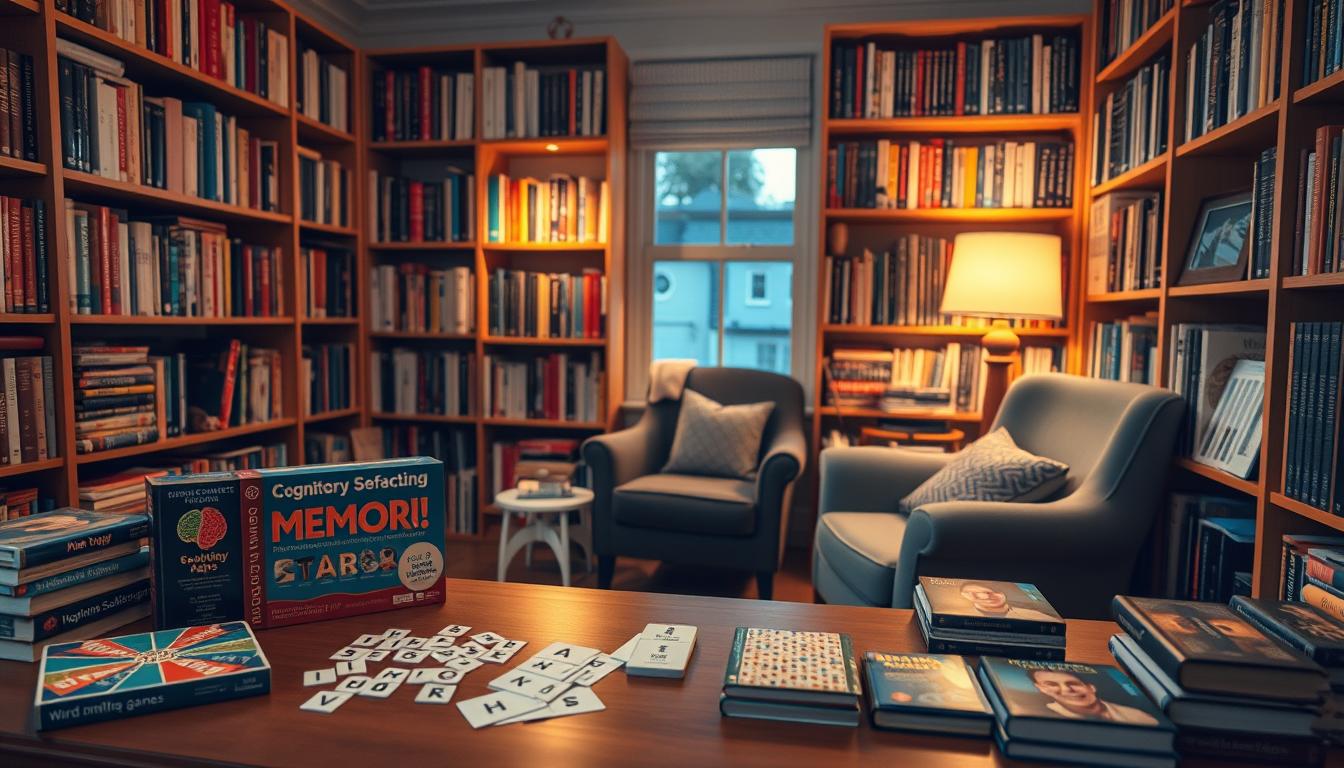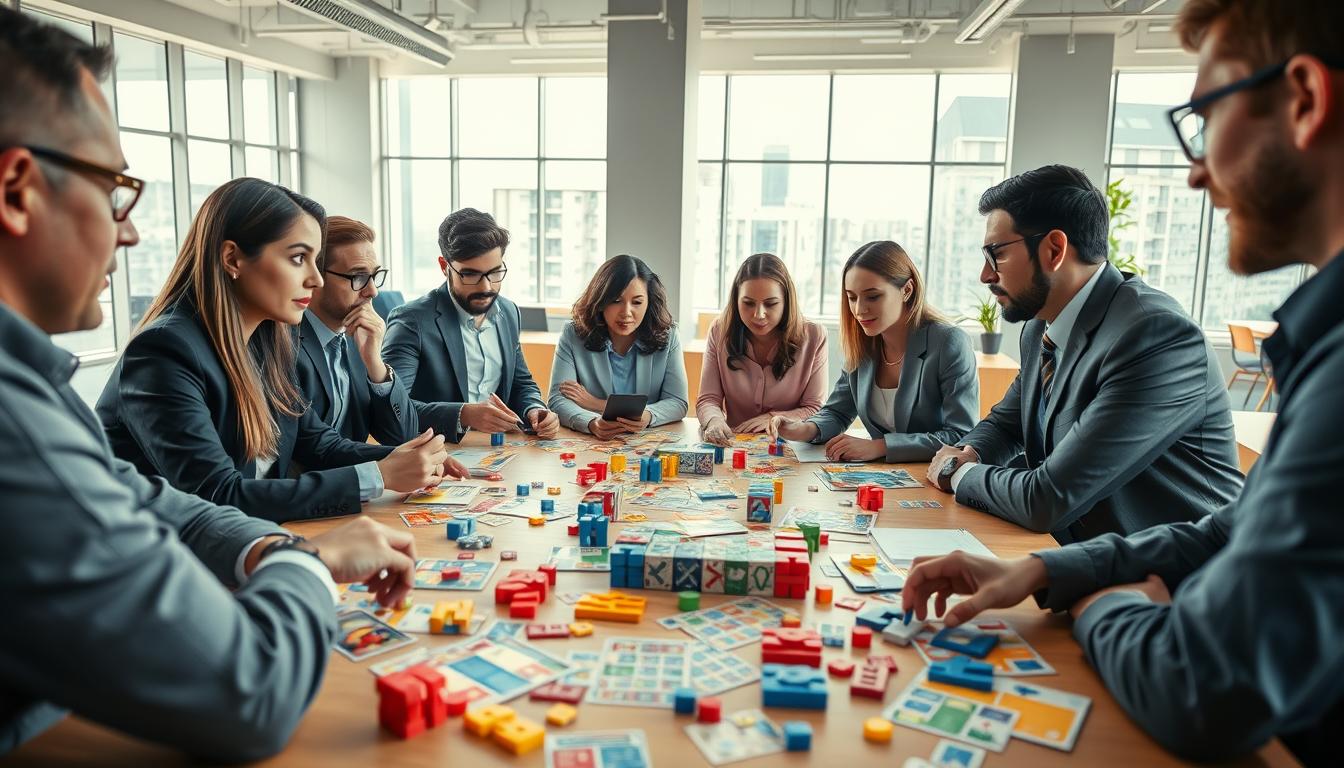Mental games to strengthen name memory in adults
Ever found yourself remembering song lyrics but forgetting someone’s name right after? Improving name memory is key for making connections in social and work settings. This article dives into mental games that boost memory for adults. Playing these games can help you remember names better, enhancing your interactions with others.
The Importance of Name Memory in Social Interactions
Remembering names is key to good social interaction. It boosts our skills in getting along with others and helps us make strong connections. When we remember names, people feel important and valued.
This feeling of being recognized can make group settings better. It helps everyone feel more connected and valued.
Studies show forgetting names can make social situations awkward. When we can’t recall names, talking becomes harder. This can put up walls between people.
Good name memory is vital for keeping relationships strong. It makes our personal and professional lives better. Being able to remember names makes our interactions richer and supports our professional networks.
Getting better at remembering names can make social situations more enjoyable. It also boosts our confidence when we’re around others. Learning this skill is crucial for building lasting relationships and creating a supportive community.

Understanding Memory and Recall Mechanisms
Knowing how memory works is key to remembering names well. Memory has three main parts: encoding, storage, and retrieval. Encoding is when we process new information. Storage is keeping that info for later. Retrieval is when we bring it back to our minds.
By understanding these steps, we can find better ways to remember names. Cognitive science shows that memories are easier to recall when they’re linked to something meaningful. This means learning names in a way that connects them to something we already know.
Using all our senses or making memories vivid helps us remember better. So, to improve at remembering names, we need to focus on both the process of recalling and how we store information in our brains.

How Brain Games Work to Enhance Cognitive Function
Brain games are fun and help improve your mind. They challenge you, making new connections in your brain. This boosts your mental skills, just like exercise does for your body.
Playing brain games regularly makes you better at solving problems and remembering things. They work your brain in many ways, helping it stay flexible. This flexibility is key to keeping your mind sharp and performing well every day.
| Cognitive Skill | Brain Game Example | Benefit |
|---|---|---|
| Memory Retention | Memory Match | Enhances memory retrieval skills and short-term memory. |
| Problem-Solving | Sudoku | Improves logical reasoning and critical thinking capabilities. |
| Attention | Brain Age | Boosts focus and concentration through time-sensitive tasks. |
| Reaction Time | React & Conquer | Enhances quick decision-making and reflexes. |
Adding brain games to your life makes learning fun. They help improve your mind in lasting ways. There are many mental exercises out there, waiting to help you reach your brain’s full potential.
Brain Games to Improve Name Recall
Improving name recall can be fun with brain games. These games use associative techniques. They connect new names with things we already know or images we love. This makes learning names easier and more fun.
Benefits of Associative Memory Techniques
Associative techniques have many benefits. They help us remember names better by linking them to images or things we already know. This makes remembering names in social situations easier.
- Improved retention of names, resulting in heightened confidence during interactions.
- Increased engagement during conversations, as individuals feel less likely to forget names.
- A more enjoyable process of learning, as participants connect memories with fun imagery.
Common Memory Games to Try
Adding common memory games to your routine can really help with name recall. Here are some games to try:
- Name and Face Match: A game that involves pairing names with photographs, reinforcing the visual-memory connection.
- Story Associations: Creating short stories that link a person’s name to their personality or interests fosters memory retention.
- Name Repetition Challenge: In this game, participants repeat names several times during the conversation to strengthen memory links.
Fun Name Memory Games for Groups
Playing group memory games is a fun way to connect and remember names. These games make the atmosphere lively and help people remember each other’s names better. Icebreaker activities are key, letting people show their true selves and practice memory skills. Here are some fun ways to start name memory games for groups.
Introductory Icebreaker Game
One great icebreaker game is when everyone shares their name and a fun fact. It could be a hobby, an interesting fact, or a favorite food. This helps create a mental picture, making it easier to remember names.
After everyone shares, you can ask the group to repeat names or facts. This helps reinforce memory.
Variations on Classic Name Games
Classic name games can be made more interesting by adding a group twist. Here are some fun variations:
| Game Variation | Description |
|---|---|
| Alliteration Names | Players create a unique name using their personal detail that starts with the same letter. For example, “Creative Cathy loves knitting.” |
| Storytelling Names | Each person shares their name and adds it to a short story. This makes the memory and interaction more engaging. |
| Name Chain | Players repeat the names of all previous participants before introducing themselves. This method helps reinforce recall through repetition. |
These variations make classic games more exciting and encourage deeper connections. They help ensure memorable experiences and improve memory skills.
Visual Techniques to Enhance Name Memorization
Using visual memory techniques can really help remember names better. When you link a name to someone’s unique features, it makes a strong mental picture. For instance, associating a name with a special hairstyle or accessory makes it easier to remember.
Imagery is key in improving memory. By picturing the letters of a name or using symbols related to the person, you make connections that stick. Mind maps are also great for this. They show how names and their traits are connected, helping you remember better.
- Picture Distinctive Features: Link a name with visual traits.
- Create Symbolic Associations: Use symbols that represent names.
- Develop Mind Maps: Diagram relationships for better recall.
Trying out these visual methods can make remembering names fun. You might find that some work better for you than others. So, don’t be afraid to try different approaches to see what works best for you.
Leveraging Neuroplasticity with Brain Training
The brain can change and adapt throughout our lives. This is called neuroplasticity. It’s the key to improving our brain function through training. Activities like memory games help both kids and adults get better at remembering things.
Using neuroplasticity means we need to keep practicing. Doing brain training regularly helps our brain make stronger connections. This makes it easier to remember names and facts.
Using different brain training methods is best. Puzzles, memory games, and quick thinking tasks all help. They make our brains stronger and more adaptable. This leads to better memory skills.
Effective Strategies for Remembering Names
Remembering names can be tough, but good memory strategies help a lot. Using proven memory techniques improves how well you remember names. This makes it easier to recall names in different social settings. Here are some ways to boost your name recall skills.
Using Mnemonic Devices
Mnemonic devices are great for better memory. Techniques like rhyming names or making acronyms make new names easier to remember. For example, linking “Rose” with “nose” makes the name stick in your mind.
These devices help by linking new info to things you already know. This makes remembering names in social situations easier.
Personalized Memory Techniques
Personalized memory techniques fit your learning style. Making strategies your own helps you remember names better. For example, picturing a unique trait of someone helps you remember their name.
Creating stories or linking names to places you know also helps. Making memory strategies your own makes them fun and effective.
Digital Brain Games for Name Recall Practice
In today’s fast world, many want to boost their memory with digital brain games. These games are fun and help improve name recall. Apps like Lumosity, Peak, and NeuroNation offer programs to sharpen memory, especially for names and faces.
Overview of Popular Apps and Platforms
Digital brain games are getting more popular because they’re easy to use and work well. Lumosity has many games to test and improve memory. Peak offers short, fun challenges to boost brain power. NeuroNation has personalized training for better memory skills, like remembering names.
With these apps, you can really improve your memory.
How to Choose the Right Game for You
Choosing the right game depends on your goals and what you like. Look at the variety of games, how easy it is to use, and if you can track your progress. Reading reviews and trying out apps can help find the best one for you.
By focusing on these points, improving your name recall can be fun and rewarding.
The Role of Consistency in Memory Training
Being consistent in your training is key for improving memory and brain function. Regular sessions of cognitive exercises boost your skills and help your memory grow. Studies show that spending 15-30 minutes daily on brain games can greatly improve your memory.
Adding a mix of cognitive exercises to your routine makes learning more effective. It helps you remember names and other important information better. By regularly challenging your brain, you can see big improvements in your thinking abilities. Sticking to this routine is essential for lasting memory gains.
Mental Exercises Beyond Name Recall
Just focusing on remembering names is a big chance to get better. Adding other mental exercises can really boost your brain power. Doing different brain challenges helps not just with names, but also keeps your brain healthy.
Things like solving puzzles, playing strategy games, and learning new things are great for your brain. Each one works on different parts of your brain. For instance, puzzles help with solving problems, while strategy games make you think critically.
Mixing these activities into your daily life is key to training your brain well. They work together with memory games to make your mind better at remembering things, including names. Choosing a variety of mental exercises helps your brain stay healthy for a long time.
Insights from Research on Brain Games and Memory
Research on brain games shows how mental exercises can boost memory. Games like crossword puzzles and memory card matching improve thinking skills. They may also lower the risk of memory diseases in older people.
Studies reveal that certain brain games target different memory areas. Puzzle-solving, for instance, uses short-term memory for clues and long-term memory for patterns. This shows a deep connection between brain games and memory.
More research is needed to understand how brain games enhance memory. It’s clear that regular practice is key to keeping the mind sharp. This helps maintain cognitive health over time.
Conclusion
Playing brain games can really help adults remember names better. This makes social interactions smoother and builds stronger connections. These games not only boost memory but also give people more confidence when they meet new people.
Using techniques like associative learning and digital games can help improve memory. Whether it’s through group fun or personal exercises, there are many ways to get better at remembering names. By embracing these games, we can enhance our social skills and improve our relationships.
FAQ
Why is remembering names important in social and professional settings?
Remembering names helps build connections and relationships. It shows trust and makes people feel valued. This improves communication and social interactions.
What brain games can improve name memory?
Brain games like matching names with faces and word association games help. They also include exercises that focus on unique characteristics.
How do memory techniques improve name retention?
Memory techniques link new names to what you already know. This makes it easier to remember names when you see them again.
What role does neuroplasticity play in enhancing cognitive functions?
Neuroplasticity is the brain’s ability to change and adapt. Brain training strengthens mental pathways, improving memory and mental agility.
How often should one practice memory games for effective results?
Practice memory games daily for 15-30 minutes. This consistent effort leads to better memory. A regular routine helps keep the benefits.
Are there digital platforms available for practicing name recall?
Yes, digital platforms like Lumosity, Peak, and NeuroNation offer brain games. They help improve name recall and other cognitive skills.
What are some effective visual techniques for name memorization?
Visual techniques like linking a name to a person’s unique feature help. Creating mental images also strengthens memory by forming strong brain connections.
Can engaging in broader mental exercises benefit name memory?
Yes! Mental exercises like puzzles and strategy games boost cognitive flexibility. They also improve verbal skills, helping with name memory.
How can personalized memory techniques enhance recall capabilities?
Personalized techniques fit your learning style. They make it easier to connect new names with what you already know. This increases your chances of remembering names.
What insights does current research provide about brain games and memory?
Research shows regular brain activities improve cognitive function. It also reduces dementia risks. Consistent practice is key for better memory.














